
LIBRI DI ALFIO LUCCHINI
La ricerca ha estratto dal catalogo 69 titoli

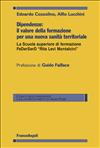
La Scuola superiore di formazione FeDerSerD "Rita Levi Montalcini"
In mancanza di un indirizzo nazionale che preveda una formazione universitaria specifica sulla clinica delle dipendenze patologiche, i professionisti del settore ormai da 40 anni propongono contesti formativi permanenti a cui FeDer-SerD contribuisce in modo importante. La nascita della Scuola superiore di formazione “Rita Levi Montalcini” segna un ulteriore passo avanti dell’impegno formativo. Il volume vuole aiutare i professionisti ad approfondire sempre di più la conoscenza delle dipendenze patologiche, uno degli ambiti più belli e completi non solo per la medicina ma anche per la comprensione del futuro della società.
cod. 231.3.8
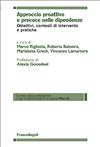
Obiettivi, contesti di intervento e pratiche
I Servizi delle Dipendenze (SerD) sono snodi importanti della medicina del territorio e stanno realizzando esperienze innovative per rispondere tempestivamente e in modo efficace ai bisogni di salute. Questo volume delinea le basi dell’approccio proattivo e precoce nelle dipendenze e descrive numerose esperienze territoriali, diverse per target e organizzazione, ma tutte improntate all’intervento proattivo e precoce.
cod. 231.3.7
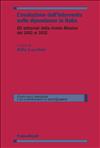
Gli editori della rivista Mission dal 2022 al 2022
Questo volume vuole rileggere lo sviluppo scientifico e organizzativo dell’area delle dipendenze in Italia attraverso gli editoriali del periodico della società scientifica leader nel settore. I 58 editoriali dal 2002 al 2022 della rivista Mission, Italian Quarterly Journal of Addiction sono ricchi di riflessioni, notizie, analisi, speranze, denunce, proprie di un contesto, come quello delle dipendenze, che ancor oggi fatica a liberarsi dallo stigma e dalle visioni ideologiche che lo hanno accompagnato lungo tutta la sua storia.
cod. 231.3.6
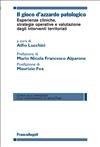
Esperienze cliniche, strategie operative e valutazione degli interventi territoriali
Il volume affronta il tema del gioco d’azzardo patologico sotto vari aspetti: vengono aggiornate le conoscenze scientifiche sulla natura del gioco e le caratteristiche che lo possono rendere una patologia; vengono proposti modelli di intervento di sensibilizzazione, prevenzione, formazione che vedono nel territorio la risorsa e il luogo di azione; vengono descritte esperienze e riflessioni di presa in carico e cura delle persone malate di GAP curate da noti professionisti italiani e stranieri.
cod. 231.10



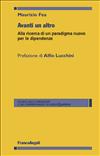
Alla ricerca di un paradigma nuovo per le dipendenze
Con un taglio multidisciplinare, che abbraccia filosofia, biologia, etica, antropologia e psichiatria, il volume pone numerosi interrogativi sull’ontologia della dipendenza, cercando di andare oltre lo sguardo finora adottato, spesso incentrato solo sulla scienza medica.
cod. 231.3.3
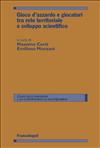
Quando dobbiamo parlare di gioco d’azzardo e quando di ludopatia? Quali sono gli interventi di cura? È possibile fare prevenzione? Il volume offre una visione d’insieme sul fenomeno del gioco d’azzardo, sui giocatori e sui possibili disturbi, partendo da una narrazione storico-culturale e trattando i diversi aspetti da differenti punti di osservazione. Il libro vuole essere un utile strumento non solo per i professionisti del settore ma anche per quanti, interagendo nella più ampia rete territoriale, siano interessati al fenomeno in ambito preventivo, di ascolto o di cura.
cod. 231.3.1


Background Hepatitis C is a disease correlated with severe systemic consequences having elevated social and health costs. The HCV elimination is a public health concern that may be solved reaching DAAs treatment for drug users. The principal aim of this work is to evaluate the cost-benefit of a point of care for HCV treatment of drug users inside Drug abuse services (Ser.D.). Methods The study consists in a cost-benefit analysis able to evaluate the “return of health” induced by a point of care for a HCV treatment. Results The work shows that the point of care is cost-benefit in comparison with the “traditional” treatment being cost saving for the public health system. The data suggest that the cost of the point of care is corresponding to euros 593,40 while the cost of not treatment of euros 8.679,60 (due to the direct and indirect costs of the disease). Conclusions The study demonstrate the point of care is an effective model of care able to reduce the barriers of treatment and to induce a “health return” in term of cost saving for the public health systems. Indeed, the work shows how the point of care may make the elimination HCV plans sustainable for the public health agencies.



The World Health Organization (WHO) has set up the elimination of hepatitis C virus (HCV) worldwide by 2030. The main aims of this study were to evaluate in HCV positive PWIDs: 1) the cost of patient’s journey of treated subjects; 2) the cost saving induced by HCV treatment for the public health system; 3) the potential cost for a national HCV elimination plan in drug users. We performed a non-interventional study including 1,333 PWIDs attending the Drug Abuse Units of the Public Health Service ASST Melegnano-Martesana (Milan, Italy), over one year (January–December 2017). The direct cost for the health services received by each patient during HCV treatment (excluding the cost of drug treatment) was collected using the electronic clinical database of the public health service.In the cohort of 1,333 patients we found 257 RNA HCV-positive PWIDs, 65 of which were treated. The mean health direct cost per each treated patient was € 1,418, while the mean the annual cost for each patient in waiting list for treatment was € 214. Considering that a HCV-positive PWID may infect within 3 years from infection at least 20 other new subjects, we may suppose that a HCV treatment may save about € 30,000 for the public health system. The study shows that HCV treatment in PWIDs can significantly reduce both individual and community health costs and that HCV elimination plans may be sustainable for the public health system by avoiding the enormous costs of the disease burden.

The epidemiological data suggests that people who use drugs (PWUDs) are the most important “reservoir” for the spread of HCV infection. For this reason PWUDs should be included in all HCV elimination plan as priority target for treatment.We performed an observational study in 5 Italian Drug Abuse Services (SerDs) with the main aims to determine: 1) the prevalence of HCV infection in PWUDs; 2) the most important barriers to HCV treatment.Of the about 4,000 drug users included in the study only about the 36% was tested and of them the 20% were anti HCV positive; only about the 60% of the HCV RNA positive patients were treated.The study showed several important barriers to the screening, especially when cannot used rapid tests and/or if test is not proposed periodically, and to the linkage to care, in particular when the HCV treatment cannot be given inside the SerDs.The study has also revealed as the harm reduction measures as suggested by WHO are not offered to all PWUDs. In conclusion the study suggests how inside the SerDs the barriers for HCV treatment that can be overcome with a simpler model of treatment as represented by the point of care.




Cause, sintomi, percorsi di autoterapia
Come si trasforma l’identità sul web? Come evolve oggi la sessualità? Come si genera e si alimenta un’addiction? Cosa fare per non cadere nelle trappole della Rete? Questi sono alcuni dei quesiti da cui prende spunto il volume per spiegare quanto la cybersex addiction sia attuale e incredibilmente diffusa in persone di ogni età: adolescenti, adulti, anziani. Seguono preziosi esercizi di distensione immaginativa per chi – professional o paziente – è alle prese con questo tipo di addiction e vuole riferimenti efficaci.
cod. 231.2.8